Finishing your marathon requires more than just physical training in the months leading up to it. Proper hydration before and throughout the 42.195 km makes all the difference. This practical guide explains precisely how to drink during exercise, which isotonic drinks to choose, and which accessories to use, to make your hydration strategy a true performance advantage.
Preparing your hydration before a marathon
Starting to hydrate well with mineral-rich water several days before the race is essential to building up your body's water reserves. This technique boosts your performance while preventing the risk of hyponatremia. Thanks to this meticulous preparation, you'll rech the finish line with optimal water levels and a perfect mineral balance.
Controlled water overload
In the two days leading up to the race, runners should drink regularly to build up a slight hydration reserve. Pale yellow urine indicates optimal hydration. It's your best indicator before the start. This self-monitoring will naturally lead you to the right balance.
If your urine remains dark, drink 2 to 3ml of water per kilogram of body weight 1 hour and 30 minutes before the start. Be careful not to drink too much either: too much pure water can dilute the sodium in your blood and make you need to go to the bathroom. This is never a pleasant experience during a marathon and it's time-consuming. The goal is to start light but perfectly prepared for the effort ahead.
Practical pre-race guidelines
Four hours before the start, drink 5 to 7ml of water or a slightly sweetened beverage per kilogram of body weight. For a 70kg runner, this equates to 350 to 500ml, giving your body ample time to absorb this amount without needing frequent bathroom breaks during the race. The sodium in the beverage helps you retain water and prepares your muscles.
10 to 20 minutes before the start, drink 150 to 250ml of an isotonic drink rich in sodium, potassium, and magnesium. This last drink will stabilize your electrolytes and give you a little boost for the first few kilometers, without weighing down your stomach.
Opt for natural formulas, avoiding preservatives and other chemical additives. Always test your drink during long training sessions to estimate the quantity needed and check your tolerance and the frequency of intake. On race day, nothing will change: this golden rule will prevent many surprises and allow you to approach the starting line with complete peace of mind, having perfectly managed your hydration preparation.
Hydration and energy during the marathon
Hydration during a marathon requires a careful balance between fluid intake, carbohydrates, and electrolytes. A runner can lose up to a liter of water per hour through perspiration, depending on the intensity of the race and weather conditions. Properly managing hydration helps prevent cramps, dehydration, and fatigue.
How much to drink and when
For effective marathon hydration, aim for 150 to 250ml of fluid every 15 to 20 minutes, or 400 to 800ml per hour depending on your perspiration rate and the weather. This gradual approach maintains fluid balance without overloading the stomach.
- Ideal rhythm : Drinking small amounts regularly allows for better absorption, reduces the risk of dehydration and avoids the sloshing stomach, that sensation of liquid moving around in the stomach when you have drunk too much.
- Quantity per serving : 150 to 250ml, or a few sips, are better absorbed than a large volume all at once.
- Climate adaptation : Favor 600 to 800ml/hour in hot weather versus 400 to 500 ml/hour in cool weather
- Personal test : Weigh yourself. The difference in weight before/after training indicates your fluid loss (1 kg lost ≈ 1 liter).
We often read that a 2% loss of water in the body can impact energy levels and therefore endurance capacity by 10 to 20%, but no scientific study demonstrates this precisely.
Carbohydrates and electrolytes: an imperative
Drinking pure water during a long effort like a marathon is not enough to maintain good hydration for several physiological reasons.
- Osmotic imbalance: Pure water is not well absorbed by the intestines when it doesn't have the correct concentration of salts and sugars. A good isotonic drink (with the same concentration as blood plasma) passes through the intestinal barrier more quickly when it contains 4 to 8% carbohydrates (40-80g/liter). Ideally, you should consume 30-60g of carbohydrates per hour (up to 90g for trained marathon runners or triathletes), combining different types of sugars.
- Electrolyte loss: When we sweat, we primarily lose water, sodium, potassium, and magnesium. Replacing only water without these electrolytes dilutes the blood. This can cause cramps, nausea, or headaches. Electrolytes are therefore crucial for proper hydration during a race: 300-700mg of sodium per liter, along with other essential minerals.
- Energy needs: Water provides no energy. However, during a marathon, the body uses carbohydrates. Sports drinks therefore contain simple sugars (maltodextrin, glucose, fructose) that provide fuel for the muscles. On the other hand, regarding carbohydrate intake, pure water may be sufficient if you consume energy gels or energy compotes in addition.

What is the difference between isotonic drinks and hydration drinks?
Many beginner runners wonder what type of drink to use during a marathon. It must be said that the range of brand/products available is vast and not always very clear.
- A hydration or electrolyte drink contains only mineral salts and vitamins. They may contain very small amounts of carbohydrates, just enough to mask the mineral taste. They can be used alone for short efforts under 1 hour 30 minutes or for longer efforts in addition to energy gels or energy compotes for carbohydrate intake. Read the comparative guide to hydration drinks. to compare the compositions of the main brands on the market.
- An isotonic, energy, or sports drink must contain minerals, vitamins, and carbohydrates. It is used for activities lasting longer than 1 hour and 30 minutes. Read the comparative guide to sports drinks to compare the compositions of the main brands on the market.
Adapting to the climate and its pace
In hot weather, slightly increase your water and sodium intake to compensate for increased sweating. Fast marathon runners (under 3 hours) generally need more carbohydrates than those running 4 hours or more, as intensity directly impacts their energy requirements.
Alternate between isotonic drinks and plain water to avoid taste fatigue. After each serving of energy compote or energy gel, rinse your mouth with water. This simple tip optimizes nutrient absorption, maintains hydration throughout the race, and prevents lingering sweet tastes that can accelerate sugar saturation and promote tooth decay.
| Marathon duration | Recommended volume/hour | Carbohydrates/h | Sodium/L |
| Less than 3 hours | 600–800ml | 60–90g | 500–700mg |
| 3:00 AM – 3:30 AM | 500–650ml | 40–60g | 400–600mg |
| Over 3 hours and 30 minutes | 400–550ml | 30–50g | 300–500mg |
Smart fueling during the marathon
The end of water bottles at aid stations, a revolution!
The 2025 Paris Marathon will be plastic bottles and cups free, in an effort to protect the environment. Other road races will follow suit. This means we'll have to manage our containers, and that's something truly new!
Prepare your water bottles 500ml soft packs Pre-filled with your favorite isotonic drink to ensure you have enough fluid for 10-15km. Their wide opening allows for easy filling and the addition of energy powder, while the graduations will help you precisely manage your intake during the race.

A running belt or trail vest frees your hands and distributes the weight for greater comfort. Add a collapsible reusable eco cup in a pocket for quick water refills at official aid stations. This thoughtful organization will make your hydration plan automatic and save you a lot of stress throughout the marathon.

The London Marathon at the forefront of innovation
Since 2019, the London Marathon has been hydrating its thousands of participants without plastic, thanks to edible water bubbles. Yes, you read that right. The company Notpla has successfully transformed seaweed into edible packaging. What is surprising is that this revolutionary concept has not been replicated to date.
Recovering well after the marathon
As soon as you cross the finish line, rehydration becomes the top priority to regain your fitness and prepare for future races. Proper rehydration restores electrolyte balance, replenishes glycogen stores, and supports kidney function. For optimal absorption, spread your fluid intake over the next 2 to 4 hours—this prevents overloading your digestive system and promotes muscle tissue repair after this intense event.
Rehydrate and recharge
If possible, weigh yourself immediately after your run, then plan to drink about 1.5 times the weight you lost in the following hours. This slight overcompensation offsets residual perspiration and fully meets your hydration needs. For example, for every 1kg lost, plan to drink 1.5 liters of water, consuming it in small, regular sips rather than all at once.
- The right calculation : comparing your weight before and after the race allows you to accurately assess your losses and adapt your hydration strategy.
- Key time : take advantage of the first 30 to 60 minutes after the race to consume nutrients (bars, gels, fruit compotes, drinks) that will accelerate your recovery. This is the famous metabolic window.
- Ideal rhythm : prefer 200-300ml every 15-20 minutes rather than a large quantity at once for better assimilation.
- Warning signs : dark urine, headaches, or unusual fatigue indicate persistent dehydration requiring more fluids.
Continue to drink regularly in the days following the marathon. This will reduce soreness, accelerate muscle recovery, and help you better understand your specific hydration needs. Don't hesitate to keep track of the amounts you drink and how you feel to refine your approach based on the effort and weather conditions.
Electrolytes and antioxidants
Within an hour of finishing your race, choose a balanced recovery drink (3 for 1 or 4 for 1 carbohydrate-to-protein ratio). This combination restarts glycogen synthesis and helps repair muscle fibers. Make sure it contains sodium and other electrolytes for effective hydration.
Opt for natural drinks with antioxidants (vitamins C, E) which reduce post-race inflammation.
Frequently Asked Questions
How much water should I drink during a marathon?
Stay hydrated by drinking 150 to 250ml of water or isotonic drink every 15 to 20 minutes during exercise. This equates to approximately 400 to 800ml per hour, adjusting this according to your perspiration rate, weather conditions, and speed.
This dosage helps maintain proper hydration without overloading your digestive system. To assess your needs, weigh yourself before and after training: a 1kg weight loss is equivalent to approximately 1 liter of sweat.
How to stay properly hydrated before a marathon?
Begin your pre-hydration 48 hours before the race by gradually increasing your water intake. Monitor the color of your urine: a light yellow indicates good hydration. Four hours before the start, drink 5 to 7ml of fluid per kilogram of body weight.
In the 10 to 20 minutes before departure, drink 150 to 250ml of isotonic drink to provide sodium and electrolytes. Be careful not to drink too much, however, as this could dilute your blood sodium levels. Trust your thirst and your body's signals to determine your hydration level.
When should I take energy gels during a marathon?
Consume an energy gel (20-25g of carbohydrates) every 30 to 45 minutes, depending on your pace and tolerance, in combination with your isotonic drink. To facilitate absorption, drink 150 to 250ml of water after each serving.
Most marathon runners need 30 to 60g of carbohydrates per hour, which can go up to 90g for highly trained runners. Always test your energy gels during training sessions to find the right balance before race day.
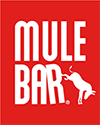
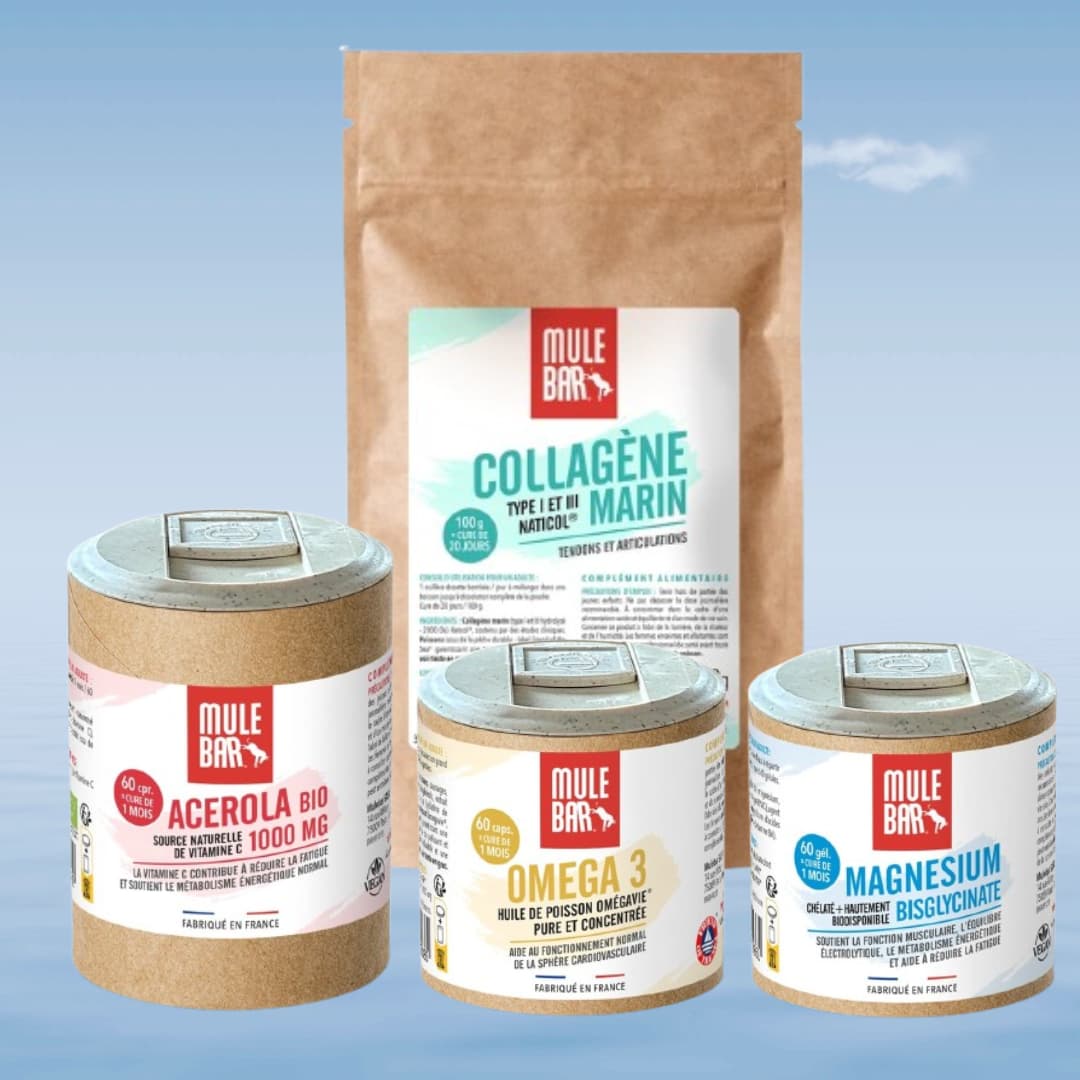

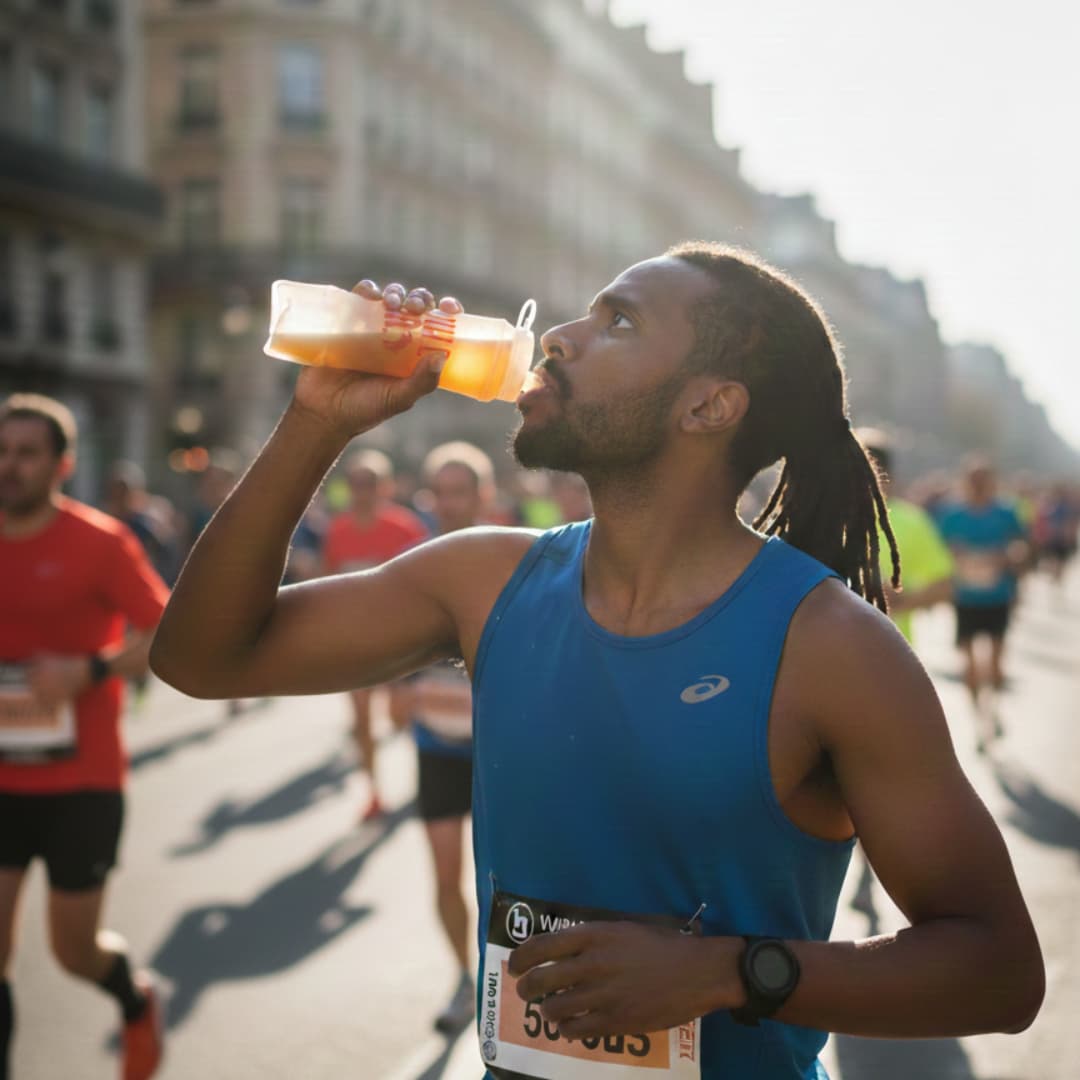
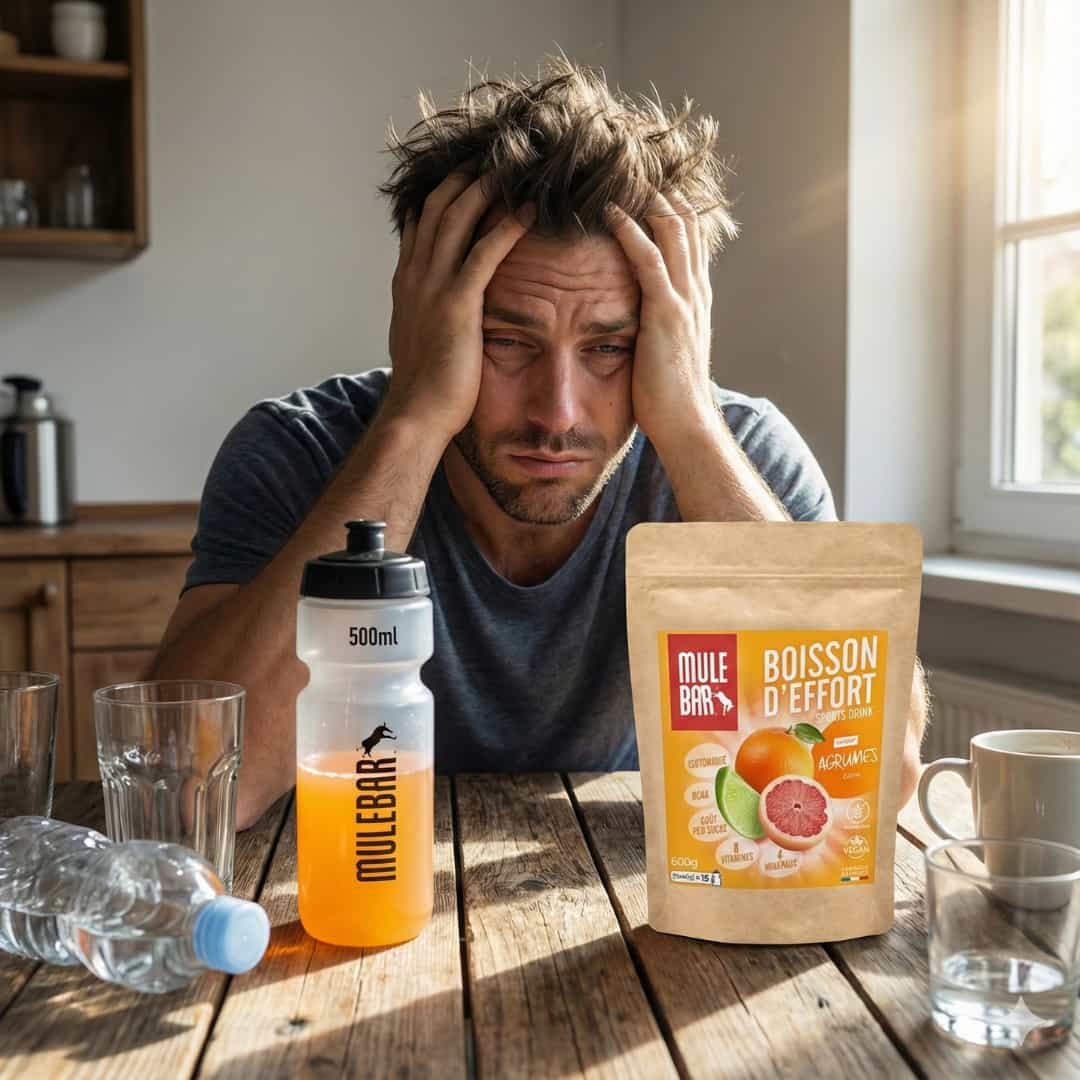
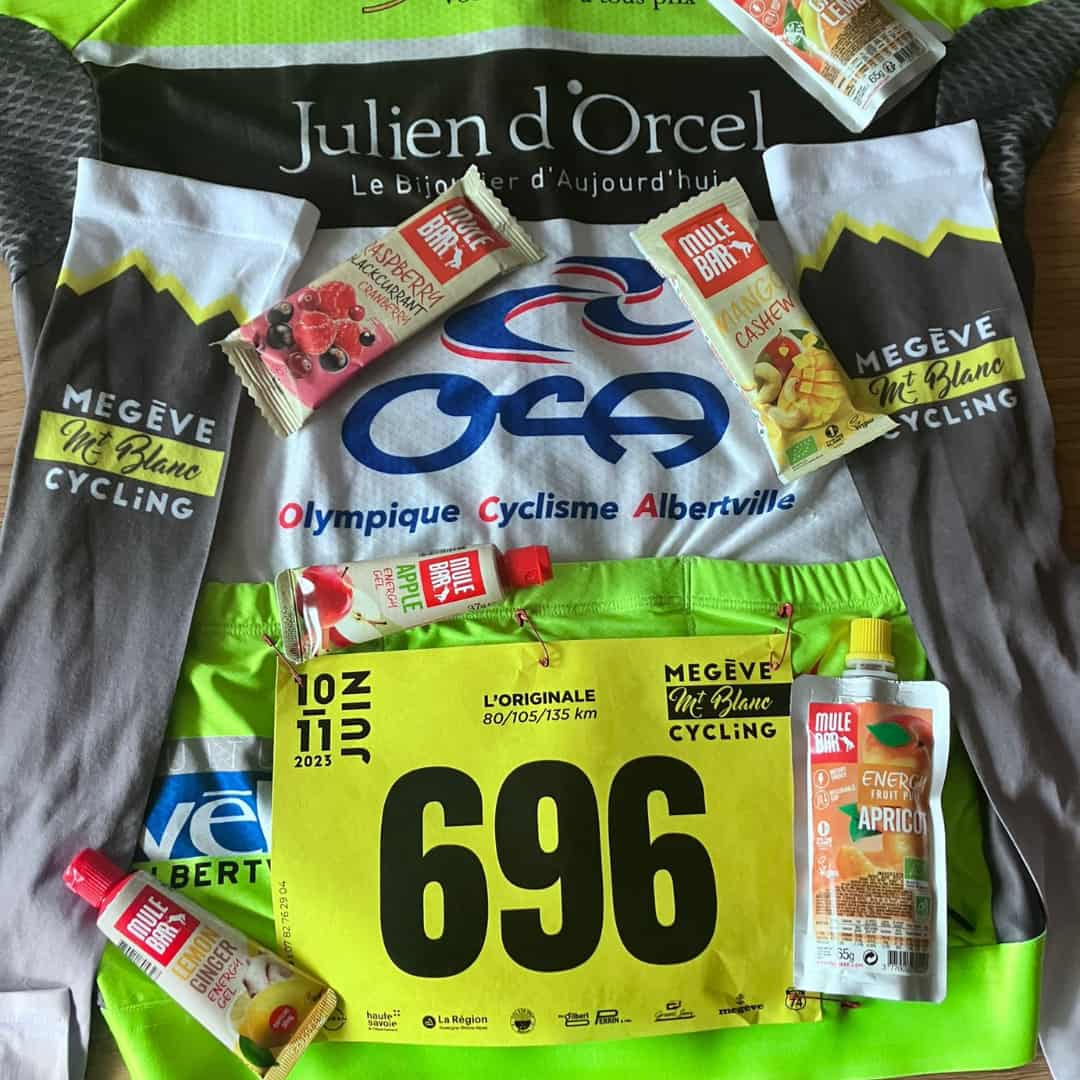
Leave a comment
This site is protected by hCaptcha and the hCaptcha Privacy Policy and Terms of Service apply.